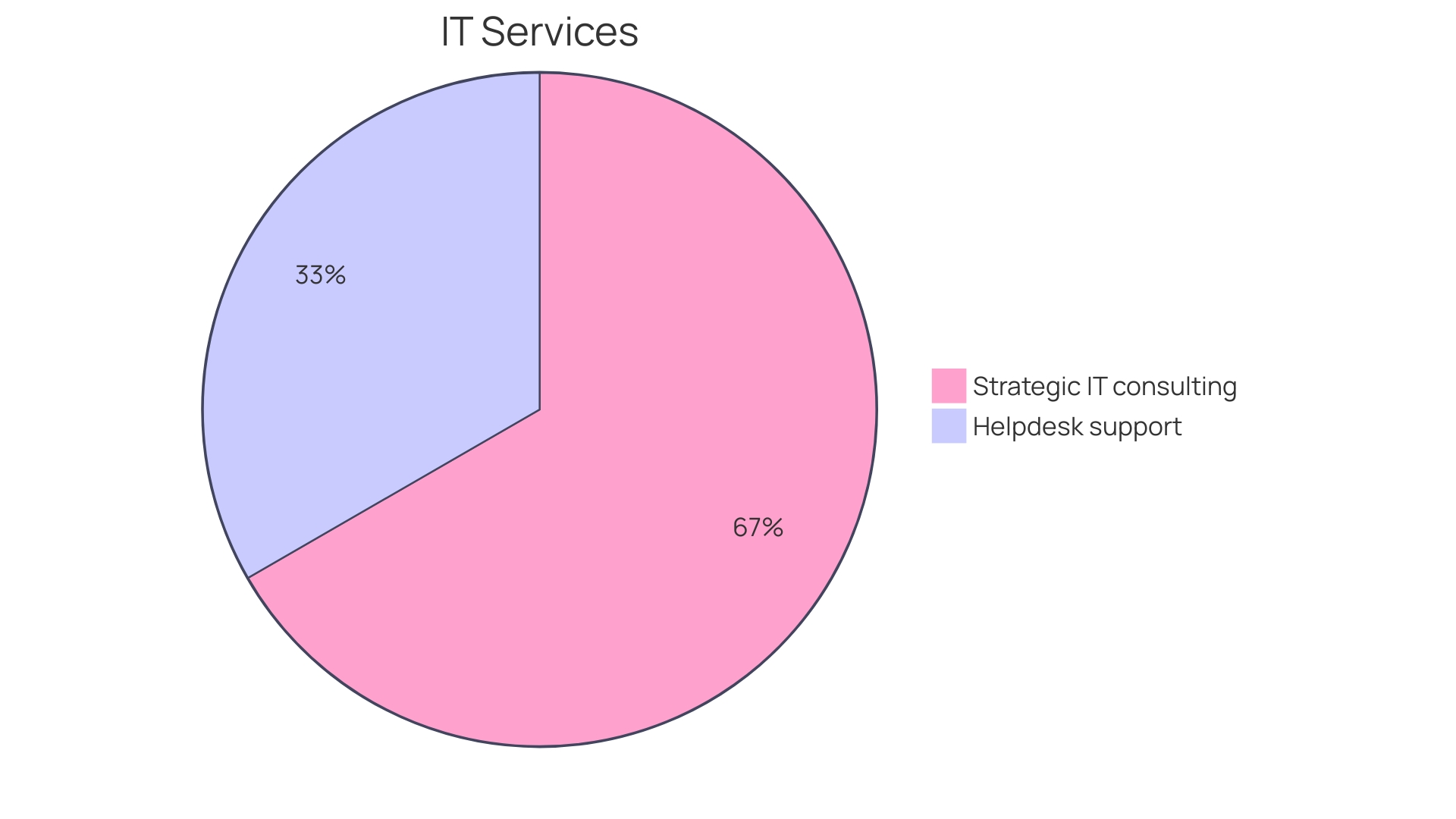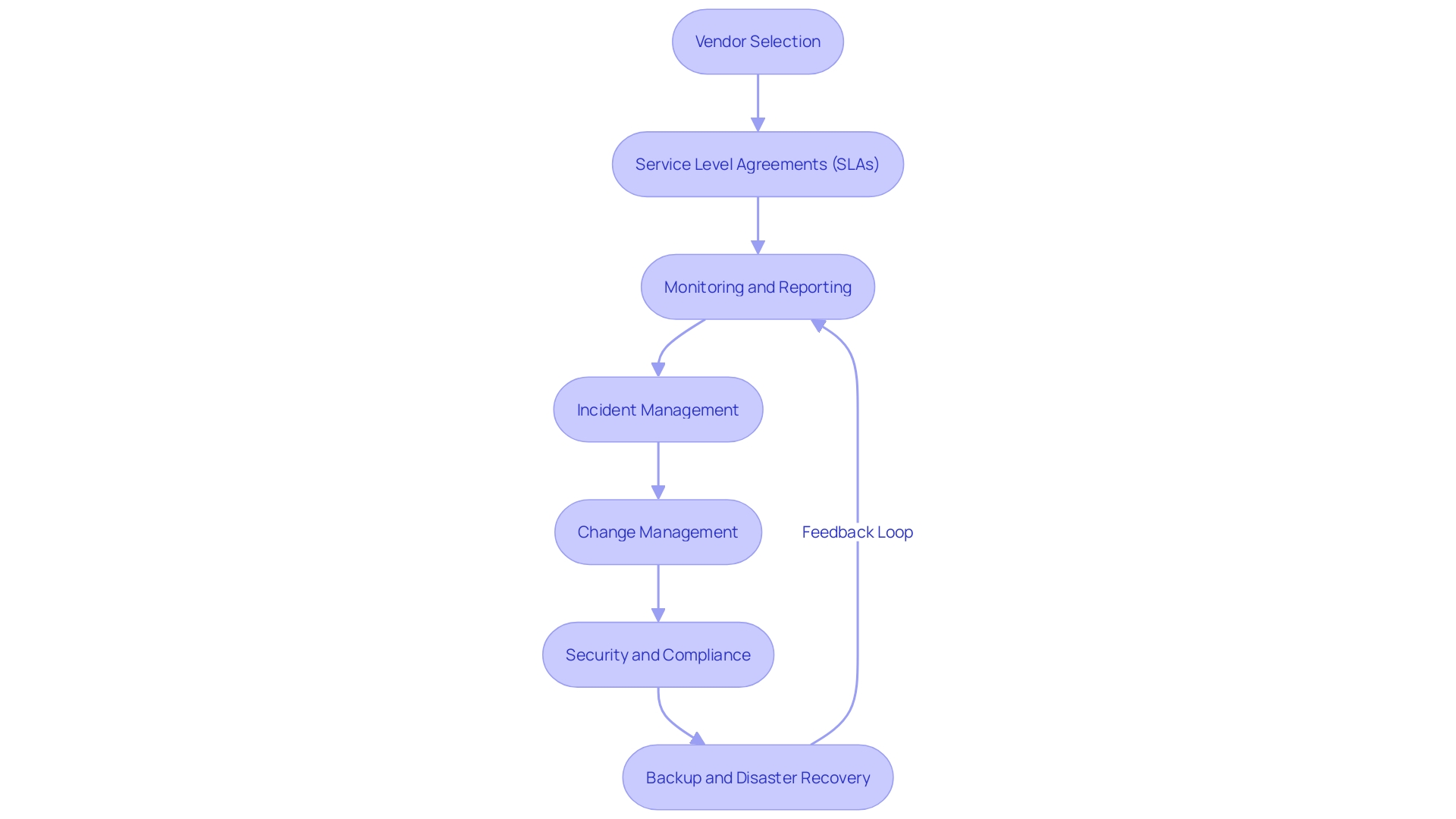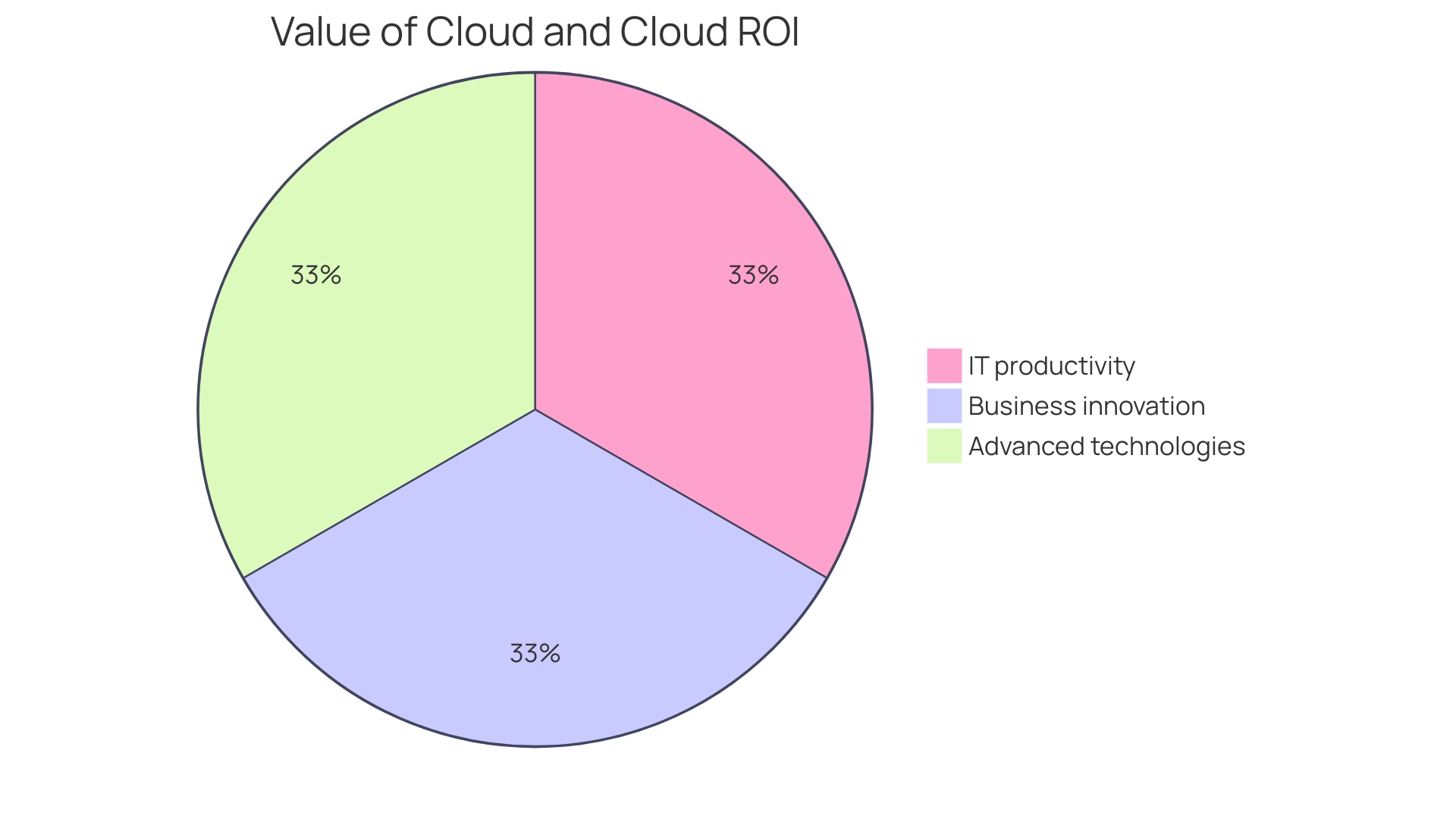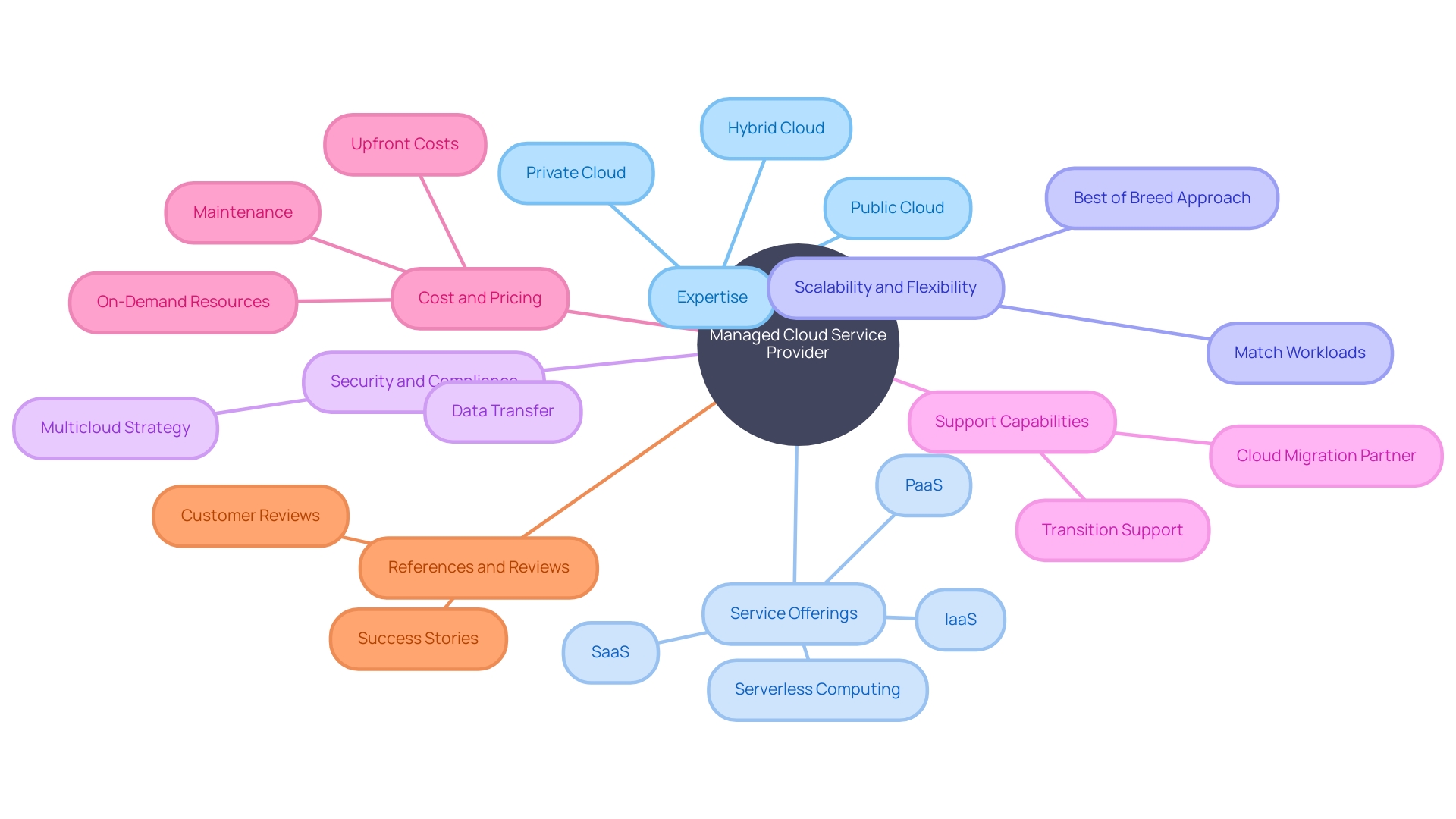Introduction
Managed Cloud Services have become essential for organizations looking to enhance their technological capabilities and maximize their investments in the cloud. These services, provided by external service providers, offer a range of IT solutions to streamline the management and optimization of cloud infrastructures, applications, and data. With the ever-increasing complexity of the business environment and the need for agility, cost efficiency, and security, Managed Cloud Services provide a strategic opportunity for organizations to stay competitive in the digital marketplace.
In this article, we will explore the benefits, types, key components, and working of Managed Cloud Services, as well as the importance of security and compliance. We will also discuss the cost efficiency and scalability offered by these services and provide guidance on choosing the right Managed Cloud Service provider. Lastly, we will examine the common challenges and considerations organizations face when adopting Managed Cloud Services and delve into the future of this rapidly evolving field.
Join us as we uncover the transformative power of Managed Cloud Services and their role in driving innovation and success in the cloud era.
What are Managed Cloud Services?
Managed Services cover a range of IT offerings provided by external service providers to streamline the management and improvement of infrastructures, applications, and data. These services, which include infrastructure, application, and data management, as well as security and compliance, aim to enhance operational efficiency, reduce expenses, and improve performance in the cloud.
Organizations transitioning to the cloud can choose from various deployment models—public, private, and hybrid—and service models such as IaaS, PaaS, SaaS, and serverless computing. The selection is guided by the company's IT infrastructure, business requisites, and desired outcomes. For example, a report titled 'Analyzing the Economic Benefits of Infoblox Networking and Security Management in a Multi-environment' highlights the fiscal impact of astute management, showcasing a remarkable average ROI of 334%, which includes operational efficiency upsurges and significant cost reductions.
Real-world success stories further illustrate the importance of Services that are professionally organized. For example, the Ford Foundation, with its commitment to social change, faced an evolving challenge as its content production outgrew its old CMS. By adopting a new digital strategy, the foundation could amplify its engagement and reach. Similarly, IFCO, in need of expertise in cloud technology due to its small IT department, partnered with Rackspace to leverage their extensive experience and customer-centric approach, a decision guided by the insightfulness and capabilities of Rackspace's team.
Managed Cloud Services are becoming more and more important to organizations' digital strategies, especially as IT spending on infrastructure hosted in the cloud increases and companies strive to maximize their technology investments. The ever-changing nature of the corporate environment, with constant rivalry and customer requirements, highlights the significance of adaptability, cost effectiveness, and protection offered by cloud-based solutions. A subscription-based model further offers the flexibility of a pay-as-you-go structure, allowing companies to allocate funds more effectively.
In conclusion, with the strategic selection of cloud services and the right partnership, organizations can harness the transformative power of the cloud, ensuring innovation and a competitive edge in the digital marketplace.
Benefits of Managed Cloud Services
Organizations have the chance to improve their technological capabilities while staying focused on their core business objectives through the use of strategic cloud services. Here are the multifaceted advantages of partnering with a Managed Cloud Service provider:
-
Specialized Expertise: Leveraging the specialized knowledge of Managed Cloud Service providers can be instrumental. For example, Rackspace Technology's partnership with IFCO showcases how deep expertise in cloud technologies can be utilized to guide organizations, especially those with limited in-house IT resources, through the complexities of cloud management.
-
Flexibility in Scalability: The dynamic nature of demands an infrastructure that can swiftly adapt. Managed Cloud Services excel in providing the necessary scalability and flexibility, enabling businesses to adjust their resource usage in alignment with fluctuating demands, as demonstrated by the anticipatory measures taken by Bleu, for the onboarding of various French organizations onto their platform.
-
Cost-Effective IT Management: Outsourcing IT management can lead to substantial cost savings by eliminating the need for extensive in-house infrastructure and personnel. Enterprises can allocate their financial resources more efficiently, echoing the sentiment of the comprehensive guide on migration to the skies, which emphasizes the significance of aligning investments in the fog with the expected benefits.
Providers like Bleu, established through the collaboration of Capgemini, Orange, and Microsoft, offer strong security measures and compliance protocols to safeguard sensitive data and adhere to industry-specific regulations, ensuring that organizations meet the high standards of a 'cloud de confiance'.
-
Strategic Focus on Core Functions: By entrusting the technical complexities of cloud management to a provider, organizations can channel their internal competencies towards innovation and strategic growth, a benefit underscored by the transformative impact that cloud migration partners can have on a company's operational effectiveness.
-
Proactive System Monitoring: Continuous monitoring and maintenance are essential elements of Managed Services, as they proactively resolve potential system issues, ensuring uninterrupted operational activities. This proactive strategy was essential for Lex Machina, whose intricate database management was streamlined through the implementation of overseen cloud services.
-
Disaster Recovery Assurance: The inclusion of disaster recovery solutions within Services that are supervised is crucial for the continuity of operations. The resilience and availability of geographically distributed data centers, such as those planned for the Bleu platform, exemplify how managed services can minimize downtime and facilitate rapid recovery in unforeseen circumstances.
To summarize, the implementation of supervised cloud services offers a comprehensive range of advantages that can greatly enhance infrastructure in the cloud, decrease operating costs, and enhance overall business performance.

Types of Managed Cloud Services
Managed Services include a range of offerings designed to support and enhance cloud environments. Organizations can leverage these to ensure their technology aligns with their strategic imperatives.
-
This fundamental service manages the infrastructure layer of Infrastructure as a Service (IaaS), encompassing server provisioning, network configuration, storage allocation, and virtualization. IaaS enables organizations to rent IT resources over the internet, essentially providing a virtual toolbox that includes computing power, storage, and networking resources.
-
Platform as a Service (PaaS) Management handles the platform layer of computing, addressing needs like database management, application development frameworks, and middleware. It allows organizations to focus on development without the complexity of managing underlying infrastructure.
-
Application Management: This service ensures cloud-based applications are managed and optimized, covering deployment, performance monitoring, and troubleshooting. It is vital for businesses to ensure their applications deliver seamless user experiences.
-
Data Management services ensure the security and management of data, covering data backup, recovery, migration, and governance. With the proliferation of data and the rising importance of data-driven decision-making, these services are critical for maintaining data integrity and availability.
-
These services are designed to ensure the environment's security and compliance with industry regulations. They include threat monitoring, vulnerability scanning, access control, and compliance reporting, providing peace of mind and protecting against data breaches.
-
Hybrid Cloud Management enables the efficient operation of environments that combine on-premises infrastructure with resources from public or private computing platforms. This service is becoming more and more important as businesses seek the flexibility to run applications and store data across different types of computing infrastructure.
These categories represent just a fraction of the Managed Cloud Services available. As the demand for cloud services grows, driven by digital transformation and the adoption of technologies like IoT and AI, organizations are increasingly recognizing the value of these managed offerings. For instance, the global switch to cloud-based operations is expected to continue, with governments supporting the adoption of innovative technologies across industries. This shift is emphasized by the fact that large enterprises are increasingly investing in cloud-based services, as reported by the Dell'Oro Group, noting a surge in demand from this segment in 3Q 2023.
Key Components of Managed Cloud Services
When adopting Cloud Services, organizations gain from a collection of solutions that collaborate to guarantee a smooth experience. At the core of these services is the establishment of Service Level Agreements (SLAs), which are vital contracts detailing the performance standards, such as latency, error rate, and availability, that Managed Service Providers (MSPs) must meet. These agreements form the backbone of the trust between organizations and service providers, setting clear expectations and accountability for service delivery.
Monitoring and reporting are also essential elements, utilizing advanced tools to uphold vigilance over the infrastructure's health and performance. This constant oversight provides actionable insights, aiding organizations in tracking their usage, discerning patterns, and making informed decisions on resource allocation to optimize operations.
Ensuring rapid response and resolution of any disruptions is another cornerstone of effective incident management, thereby upholding the integrity of the computing platform. MSPs often maintain dedicated support teams, available around the clock, to manage incidents, which minimizes downtime and sustains operational continuity.
Change management processes are meticulously designed to guide the introduction of updates or modifications within the environment. This ensures that transitions are smooth and that the risks associated with changes are mitigated, maintaining stability across the system.
Security and compliance cannot be overstated; MSPs enforce stringent security protocols and adhere to regulatory standards to safeguard sensitive data. This includes encryption, controlled access, and ongoing security assessments that strengthen the computing environment against vulnerabilities and threats.
Lastly, backup and disaster recovery services form an essential safety net, offering robust solutions for data protection and swift recovery in adverse scenarios. Automated backups, secure offsite data storage, and strategic recovery plans are put in place to safeguard against data loss and expedite restoration processes, thus maintaining organizational resilience.
These elements collectively create a robust framework for managing cloud services, with each one playing a pivotal role in delivering a secure, efficient, and scalable environment for organizations. By integrating these components, Maps offer a comprehensive management solution that aligns with the diverse needs of their clients, as evidenced by successful implementations by industry leaders such as Rackspace Technology and initiatives supported by the Ford Foundation.

How Managed Cloud Services Work
Working together with a Cloud Service provider is a crucial approach for organizations aiming to improve their IT infrastructure and align technology with organizational objectives. This partnership entails a multifaceted process that commences with a thorough assessment of the company's existing IT landscape and business requirements. It is essential to identify potential areas that could benefit from migration to the cloud and services that are managed, similar to the support provided by the NVIDIA Inception program for startups at different stages using advanced technology.
Following the initial evaluation, the Managed Cloud Service provider creates an architecture customized to the organization's goals, encompassing infrastructure selection, cloud-based services, and security measures. This step recalls the approach taken by IFCO in collaborating with Rackspace Technology to leverage their expertise and gain alternative strategies during their IT department's transition.
The migration phase involves moving applications, data, and infrastructure to the sky with minimal business disruption, echoing Axel Bellermann's experience at IFCO of seeking a partner who had successfully managed similar migrations. Once completed, the service provider for the Managed Cloud Service oversees the environment in the sky, ensuring performance monitoring, resource optimization, and security management, akin to the support provided by OODA's team of experts to global entities.
Consistent enhancement is a characteristic of Services; providers continuously evaluate performance and seek areas for improvement. This is essential for aligning the cloud environment with evolving requirements and mirrors the ongoing support and innovation that NVIDIA Inception offers to its members.
Throughout this process, organizations maintain transparency and control, receiving regular reports and performance metrics, ensuring that the Services for Controlled Computing remain in sync with their broader corporate strategies. The significance of a Managed Cloud Service provider is echoed by Bernard Marr, who emphasizes that managed services are integral to leveraging technology investments and supporting digital strategies.
When navigating the adoption of cloud computing, organizations must take into consideration various computing models, including public, private, and hybrid clouds, alongside service models like IaaS, PaaS, SaaS, and serverless computing. Choosing the ideal combination depends on the company's current IT investments, needs, and desired results, as stated in the Azure Marketplace and Microsoft AppSource for private plans.
Assistance from a managed services provider for cloud-based services is crucial for a successful migration to the cloud. This guide equips businesses with the knowledge to manage the complexities of migrating to the cloud and highlights the significance of selecting a reliable cloud migration partner, ensuring seamless support throughout the transition.

Security and Compliance in Managed Cloud Services
Ensuring the security and compliance of data in cloud-based environments is a multifaceted challenge that service providers for cloud management rise to meet. They employ a variety of strategies to protect sensitive information and align with regulatory demands.
-
Data Encryption: To protect data against unauthorized access and breaches, service providers utilize encryption for both data at rest and in transit. Such encryption is a fundamental aspect of maintaining confidentiality in the cloud.
-
Access Control: These providers enforce stringent access control measures. Users are authenticated, permissions are meticulously assigned through role-based access control, and the security is often further reinforced with multi-factor authentication.
-
Threat Detection and Monitoring: The deployment of sophisticated security tools for real-time threat detection and response is standard practice. Providers use technologies like intrusion detection systems and SIEM tools, while also continuously monitoring network traffic and system logs to preempt potential threats.
-
Compliance Frameworks: Adherence to compliance frameworks such as GDPR, PCI DSS, and HIPAA is a testament to Managed Service providers' commitment to regulatory standards and protection of customer data.
-
Regular Audits and Assessments: Providers conduct periodic security audits and assessments to proactively identify vulnerabilities. These practices not only uncover potential security gaps but also guide necessary remediations.
-
Incident Response and Disaster Recovery: Robust incident response plans and disaster recovery strategies are in place to mitigate the impact of security incidents. These are designed to ensure swift incident management, data recovery, and business continuity.
These measures resonate with the experiences of organizations like IFCO, which leveraged the expertise of Rackspace Technology to navigate new territories in the cloud, and Sirius Technologies, which adopted a secure Cloud Development Environment to drive transformation in the financial services sector. Meanwhile, security teams must persist in developing innovative solutions to secure company data in the face of diverse SaaS applications, as every application requires a unique approach to security settings.
The growth of Services for Managed Cloud, with a projected increase to US$472 billion despite global economic uncertainties, is driven by the critical need for cybersecurity expertise and flexible consumption models. In the midst of a difficult threat landscape and shortages of IT talent, organizations are increasingly depending on the specialized expertise that providers of cloud services offer.
Cost Efficiency and Scalability
IT infrastructure services that are carefully monitored and supported are quickly becoming the foundation of modern IT systems, providing a wide range of financial and operational advantages.
-
Cost Efficiency: Managed Cloud Services are a boon for organizations looking to minimize IT expenses. These services eliminate the capital expenditure on infrastructure and human resources, replacing them with a predictable monthly operational cost. Suppliers of services for controlling cloud resources, such as ABSYZ, concentrate on providing cost-efficient answers that align with the financial circumstances of enterprises. By adopting a pay-as-you-go model, enterprises can divert funds from capital expenditure to other strategic areas, boosting overall financial health.
-
Resource Optimization: Expertise in cloud resource optimization is a hallmark of Managed Cloud Service providers. These professionals ensure that organizations maximize their investment by paying only for the necessary resources. This proactive resource management, coupled with ongoing monitoring and optimization, can lead to substantial cost savings. As highlighted by Satyendra Kumar, the strategic transition to managed services, underpinned by comprehensive planning and collaboration, can enhance application performance while adhering to security standards.
-
Scalability: Scalability is a cornerstone of Managed Cloud Services, providing businesses with the agility to scale resources in alignment with demand fluctuations. Service providers like ABSYZ swiftly provision additional resources, ensuring that organizations can support their growth trajectories without the burden of extensive infrastructure investment. This responsiveness is critical in today's fast-paced market environment.
-
Pay-as-You-Go Model: The flexibility of the pay-as-you-go model is a significant advantage, particularly for organizations that experience variable resource needs. It offers the freedom to scale services according to actual usage, avoiding unnecessary expenses and long-term commitments. According to the report on IT productivity and innovation, this model can greatly enhance the return on investment for cloud programs.
-
Cost Predictability: Managed Cloud Services lend a degree of financial predictability that is invaluable for budgeting and forecasting. Transparent pricing models and detailed billing reports enable organizations to have a firm grasp of their monthly IT spend. This clear financial outlook is essential for strategic planning and resource allocation.
The combination of these benefits highlights the strategic importance of Services for overseeing and controlling data and applications. As organizations navigate their digital transformation journeys, the ability to effectively manage costs while scaling operations is paramount. With the insights from this comprehensive guide, decision-makers are well-equipped to make informed choices that align with their objectives and financial strategies.

Choosing the Right Managed Cloud Service Provider
Selecting an adept Managed Cloud Service provider is pivotal for an organization's cloud strategy. The appropriate partner brings a synergy of expertise and customized services that cater to specific organizational needs, while fostering growth and ensuring data security.
The expertise of a provider should be evident through their track record. NVIDIA Inception, for example, showcases proficiency in supporting startups across various stages with advanced technology and investor connections. Similarly, when IFCO sought a partner, Rackspace's deep-rooted experience and customer-focused approach were key factors in their selection. It’s essential to select a provider whose experience aligns with your industry, ready to meet and exceed your organizational needs.
Service offerings must encompass a spectrum of management solutions, from infrastructure to applications and security services. Services provided through the use of online computing resources, such as IaaS, PaaS, SaaS, and serverless computing, should be assessed to match your organization's cloud computing model—whether it is public, private, or hybrid.
Scalability and flexibility are non-negotiable, as shown by the successful scaling of online resources for businesses similar in size to yours. A provider's infrastructure and resource availability will determine their capability to support your growth trajectory.
Security and compliance are imperative; robust measures and a strong compliance framework are crucial for data protection and meeting regulatory requirements. The provider must have the appropriate certifications and adhere to industry standards, ensuring the privacy and safety of your data.
Support capabilities and SLAs are vital for a seamless journey. Bernard Marr, a futurist and thought leader, emphasizes that managed services are integral to leveraging technology investments. Prompt response times, access to support teams, and alignment with your support needs are crucial.
The cost and pricing model should be transparent and fit within your budget. A 'pay-as-you-go' model offers cost savings and eliminates the need for expensive hardware investments. Look for clarity in pricing, hidden fees, and flexible billing options.
Lastly, references and reviews provide real-world insights into a provider's performance and reliability. Just as Rackspace's capabilities were affirmed through their engagement with IFCO, seeking feedback from existing clients can guide you to an informed decision.
With infrastructure spending projected to surpass $1 trillion, the selection of a Service provider is more crucial than ever. It's not just about embracing new platforms; it's about ensuring a partnership that propels your enterprise forward in the cloud era.

Common Challenges and Considerations
Companies utilizing services for cloud management navigate a landscape of intricate choices and considerations. It's paramount to evaluate the terms and conditions to avoid vendor lock-in, ensuring the flexibility to migrate services if necessary. Data security and privacy are at the forefront, with a critical need to understand the provider's security measures and ascertain compliance with regulations.
Compatibility with existing systems cannot be overlooked, as seamless integration is essential for business continuity. Service Level Agreements (SLAs) demand thorough review to ensure they meet the specific needs of an enterprise, including clear performance metrics and support response times.
Data access and ownership rights must be unambiguously defined with the provider, maintaining the organization's control and ownership over its data. Transparency in the provider's reporting is also crucial, enabling effective tracking of usage and costs.
Moreover, the successful implementation of cloud services requires proper change management and training, which can minimize opposition and ensure that employees are well-prepared for the transition.
For example, IFCO's collaboration with Rackspace Technology exemplifies the importance of choosing a seasoned partner, while Chess.com's growth underscores the need for robust and scalable IT infrastructure. Meanwhile, Wowza's customers' transition to Ceeblue's managed services following a significant price hike illustrates the potential for managed services to offer cost-effective solutions.
In the swiftly changing domain of computing in the sky, with 78% of organizations in 2024 embracing hybrid and multi-cloud strategies, the position of Service Providers (MSPs) as strategic partners becomes increasingly important. They not only foster digital transformation but also fortify against the ever-changing cybersecurity landscape.
By diligently addressing these multifaceted challenges and considerations, organizations can harness the full benefits of Services, ensuring resilience and agility in their operations.
Future of Managed Cloud Services
The scenery of Managed Cloud Services is being influenced by crucial progress and patterns, mirroring the ever-changing essence of computing in the sky. One specific trend is the integration of Artificial Intelligence (AI) and automation by providers of Cloud Services to streamline service delivery. The automation of routine tasks and the provision of proactive insights are just the beginning. As AI evolves, its role in driving innovation across business functions is becoming more pronounced, with marketing and sales already experiencing a significant transformation due to AI implementation.
Edge computing is another important field where Services are making progress. By bringing data processing closer to the point of data generation, edge computing provides the benefits of low-latency processing and real-time analytics. Managed Cloud Service providers are at the forefront, developing solutions that not only manage but also optimize edge environments.
Multi-cloud management is becoming more and more important as organizations adopt diverse cloud strategies. Service providers are responding by expanding their offerings to enable centralized visibility and unified management across diverse cloud platforms, facilitating seamless integration and interoperability.
In the realm of security and compliance, Service providers for Cloud Management are not taking a back seat. Investments in advanced security technologies and adherence to compliance frameworks are being prioritized to ensure data protection and regulatory compliance, which are of growing importance to organizations across industries.
The use of advanced analytics and insights is becoming more common in Managed Cloud Services. Providers are leveraging big data analytics, machine learning, and predictive analytics to enhance resource allocation, performance, and ultimately drive business outcomes.
Lastly, the focus on sustainable and green computing reflects a broader dedication to environmental responsibility within the computing sector. Service providers that handle cloud management are implementing strategies to enhance energy efficiency, lower their carbon emissions, and incorporate renewable energy sources, thus supporting the sustainability objectives of the sector.
As these developments unfold, the value of cloud across IT productivity, innovation, and advanced technologies, including generative AI, is becoming increasingly evident. Managed Cloud Services are not only responding to the demands of rapid digital transformation but are also shaping the future of how businesses leverage technology for growth and efficiency.
Conclusion
In conclusion, Managed Cloud Services offer organizations a strategic opportunity to enhance their technological capabilities and drive innovation in the cloud era. These services streamline operations, optimize cloud performance, and ensure data security and compliance.
Partnering with a Managed Cloud Service provider brings numerous benefits, including specialized expertise, agility in scalability, cost-effective IT management, robust security and compliance, strategic focus on core business functions, proactive system monitoring, and disaster recovery assurance.
Managed Cloud Services encompass various types, such as Infrastructure as a Service (IaaS) management, Platform as a Service (PaaS) management, application management, data management, security and compliance management, and hybrid cloud management.
Key components of Managed Cloud Services include Service Level Agreements (SLAs), monitoring and reporting, effective incident management, change management processes, robust security and compliance measures, and backup and disaster recovery services.
The process of working with a Managed Cloud Service provider involves assessing existing IT landscapes, designing a customized cloud architecture, migrating to the cloud, overseeing the environment, and continuously improving performance.
Security and compliance are paramount in Managed Cloud Services, with measures like data encryption, access control, threat detection, compliance frameworks, audits and assessments, and incident response strategies.
Managed Cloud Services offer cost efficiency and scalability, allowing organizations to minimize IT expenses, optimize resources, scale operations, and benefit from the pay-as-you-go model.
Choosing the right provider requires evaluating expertise, service offerings, scalability, security measures, support capabilities, cost models, and references.
The future of Managed Cloud Services is shaped by trends like AI and automation, edge computing, multi-cloud management, advanced analytics, and a focus on sustainable computing.
In summary, Managed Cloud Services enhance technological capabilities, optimize cloud performance, and ensure data security. Partnering with a reliable provider streamlines operations, maximizes investments, and drives innovation in the cloud era.




